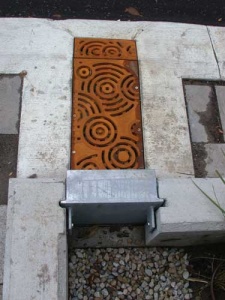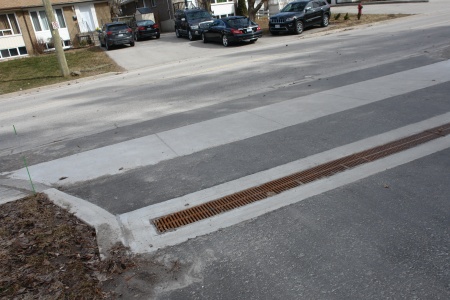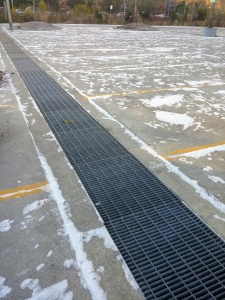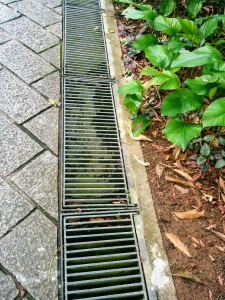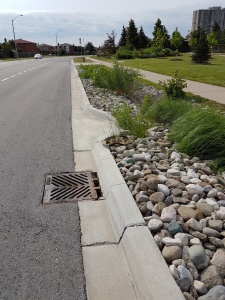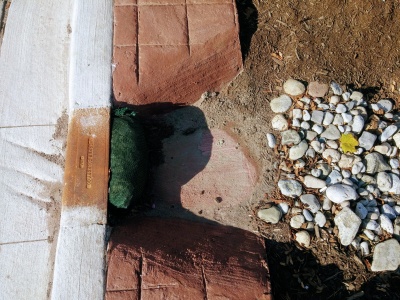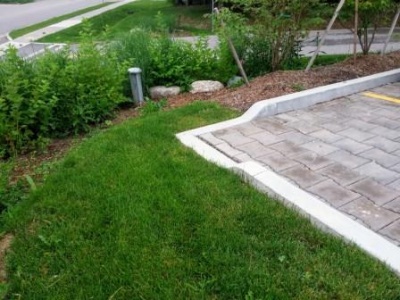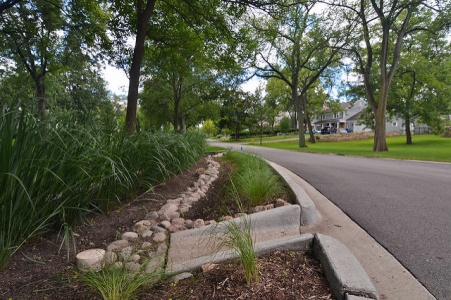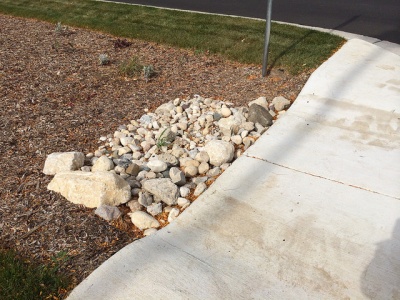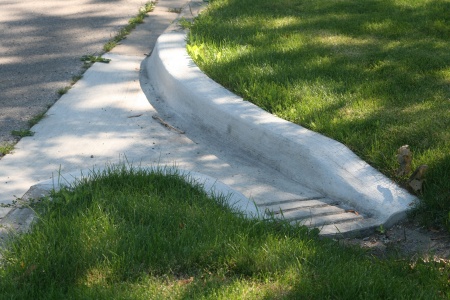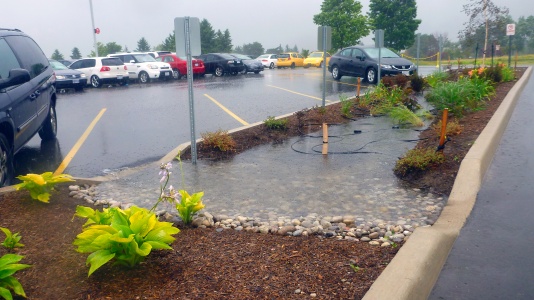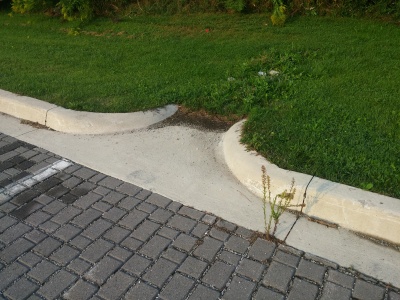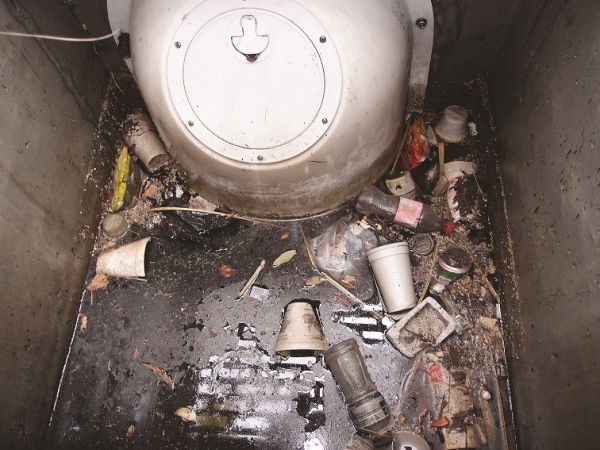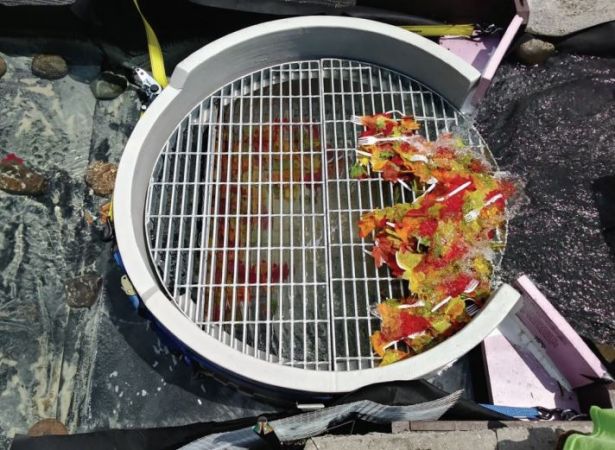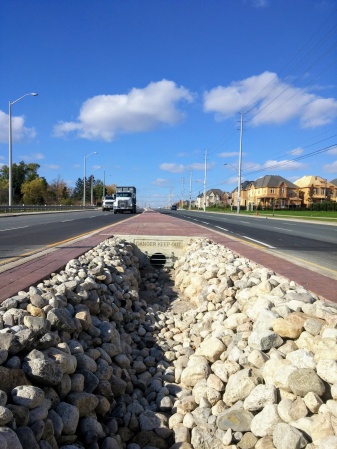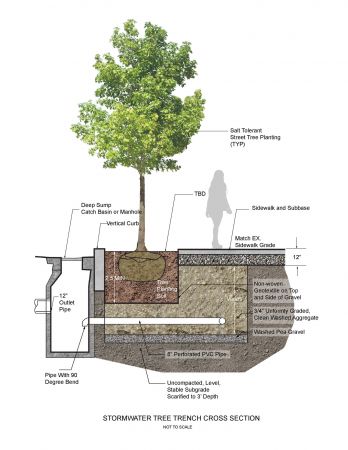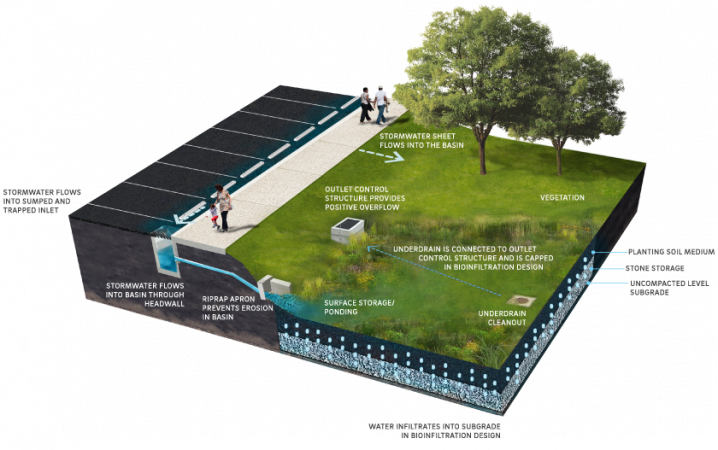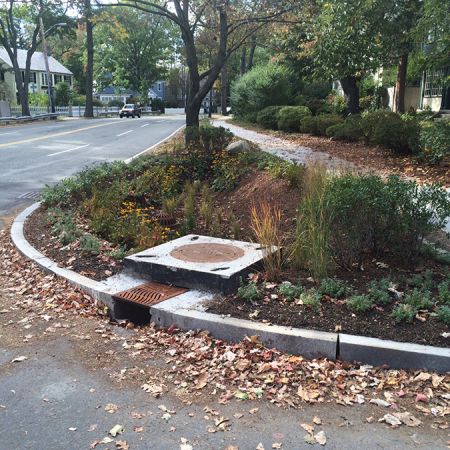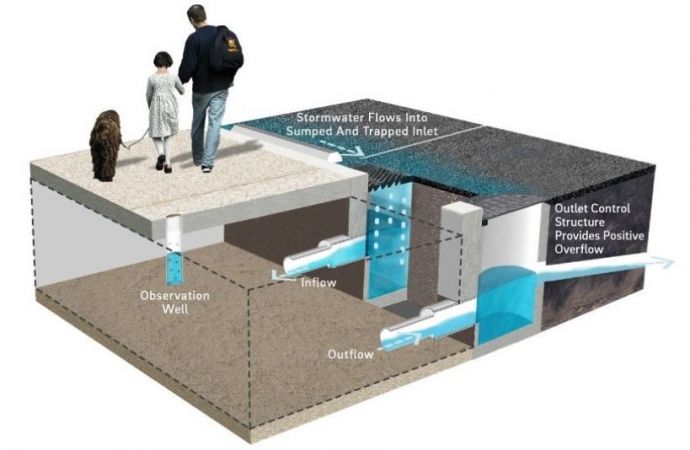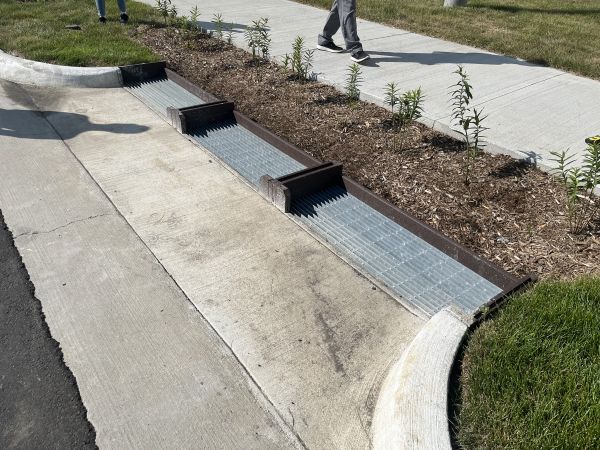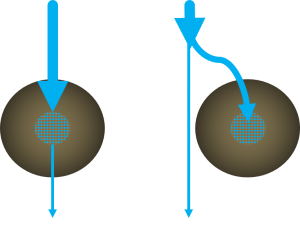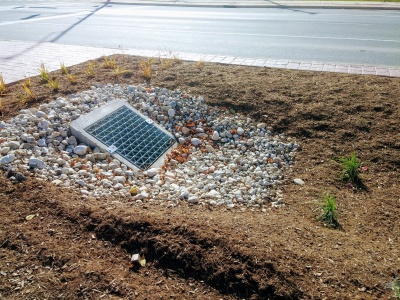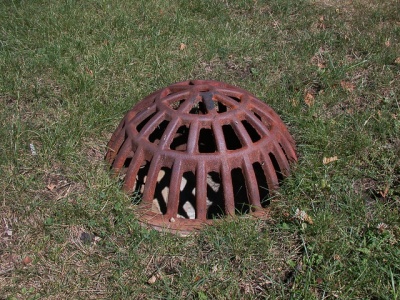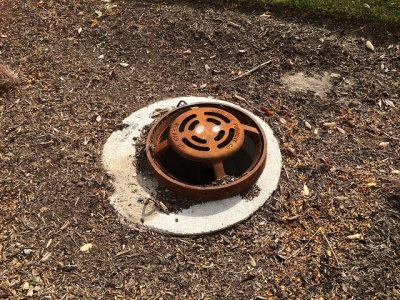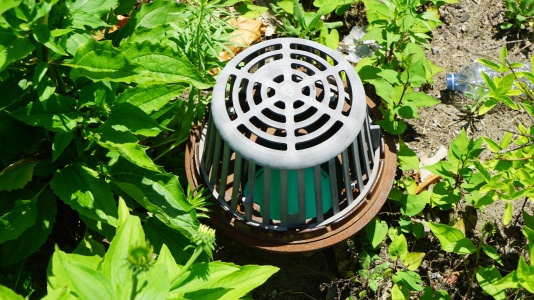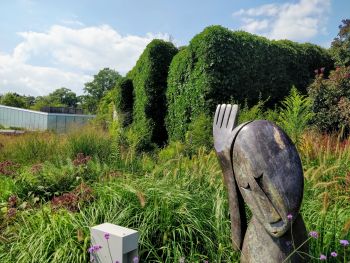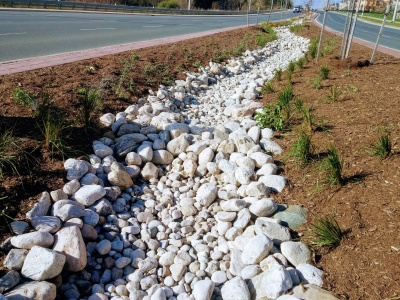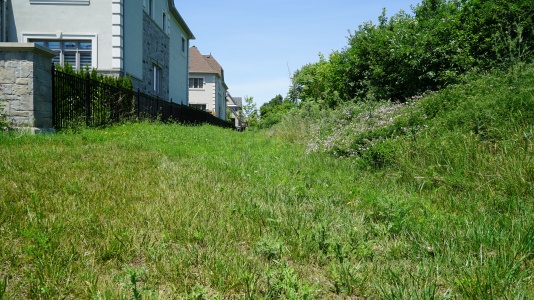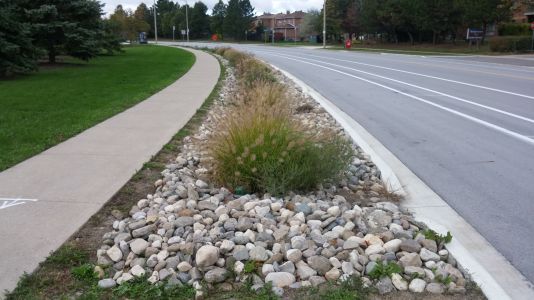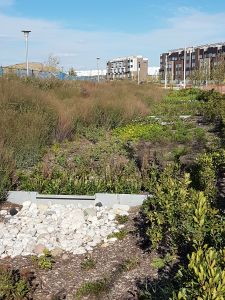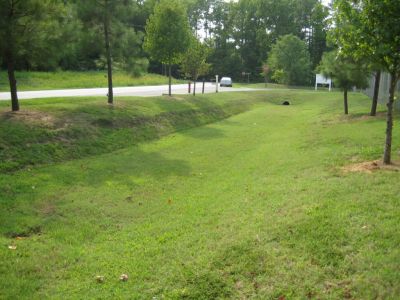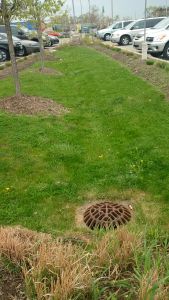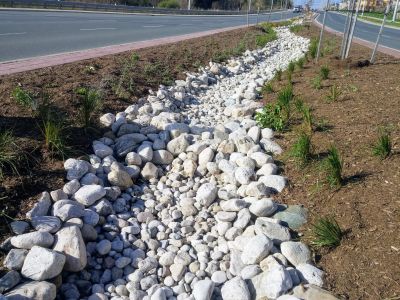Bioswales
This article is about installations designed to capture and convey surface runoff along a vegetated channel, whilst also promoting infiltration.
For underground conveyance which promotes infiltration, see Exfiltration trenches.
For design recommendations on channels in which surface flow is controlled with check dams, see Enhanced swales.
Overview[edit]
The fundamental components of a bioswale are:
- A graded channel
- Planting
- Underdrain with clean out and inspection ports
- Filter media, to permit infiltration into the facility (not necessarily to soils below)
Additional components may include:
- Impermeable membrane to prevent infiltration to soils below
- Check dams to facilitate short tern ponding
Planning considerations[edit]
Bioswales are sized as narrow linear bioretention cells. Drainage time of bioswales are typically lower than other geometric configurations of similarly sized bioretention facilities, owing to the higher hydraulic radius of the sides.
Design[edit]
Inlets[edit]
Overview[edit]
Concentrated flow inlets are associated with LID practices such as Bioretention, Stormwater planters, Infiltration trenches and chambers. Sheet flow alternatives include level spreaders, gravel diaphragms and vegetated filter strips. Practices such as permeable pavements and green roofs receive precipitation directly, whilst exfiltration trenches are connected directly to conventional storm sewers.
Inlets for BMPs in the right of way should be located:
- At all sag points in the gutter grade
- Immediately upgrade of median breaks, crosswalks, and street intersections.
It is recommended to include multiple inlets, sized to distribute inflow along the length of the practice or between multiple facilities, where feasible, rather than concentrating all inflow into a single location. (Offline overflow).
Trench drains[edit]
Trench drains are long, covered channels that collect and direct water into the BMP. They are an excellent solution for streets where walking across the entire surface is to be encouraged. They can be designed as detectable edges or part of a detectable edge, and may be used to help define curbless or 'complete streets'.
Trenches may either be shallow (where runoff volume is less of an issue) or deep and covered by a metal grate. Deeper trench drains may gather sediment and require frequent maintenance.
Drains may be configured either perpendicular or parallel to the flow direction of the roadway, collecting runoff and directing to a single inlet in the BMP.
Combination of trench drain and winter shut off gate: King Street, Kitchener, ON
Trench drain that outlets to a bioswale at the LSRCA Office in Newmarket, ON
Bioretention system, or rain garden with a decorative trench drain cover, in Portland, US Taken in April 2013. Photo credit:EmilyBlueGreen
Curb cuts[edit]
Curb cuts are breaks along the length of a curb system to allow water to flow into a LID/BMP.
Inlet aprons or depressions increase inflow effectiveness of curb cuts. Steeply angled aprons can be hazardous, especially to people bicycling. Curbside and protected bike lanes along concrete aprons should be at least 1.8 m to give cyclists adequate clear width from the curb and any pavement seams. Aprons can also be marked visually to indicate their perimeter. For aprons into bioretention, the curb may angle into the cell to improve conveyance of gutter flow into the facility. Aprons typically drop 50 mm into the bioretention cell, with another 50 mm drop behind the curb to maintain inflow as debris collects. A depressed concrete apron can be cast in place or retrofitted in by grinding down the existing concrete pavement.
Where the curb alignment along the street is straight, the curb opening may optionally have a bar across the top of the inlet.
See Curb cuts for further details and references to Ontario Provincial Standard Drawings.
This curb cut has been sawn into existing concrete as part of a retrofit. Note the temporary (erosion log) and permanent stone erosion control measures in place. Mississauga Road, ON.
Curb cut used as a controlled overflow route from permeable pavement to a bioretention facility with monitoring well, Lake Simcoe Region Conservation Authority, Newmarket, ON.
Curb cut into a bioretention facility in Brown Deer, WI. Stone is used to reduce erosion around the inlet area. Photo credit: Aaron Volkening
Stone lined inlet at IMAX site in Mississauga
The grading around this inlet prevents flow in the correct direction. i.e. from the pavement onto the grass. Not too critical in this example, as the surface is permeable pavement.
Inlet sumps[edit]
An inlet sump is recommended to settle and separate sediments from runoff where a large amount of debris is expected. Water drains into a catch basin, where debris settles in its sump. After pretreatment, water drains via a pipe or opening into the BMP. The sump can be directly connected to a perforated underdrain pipe to distribute the flow to the bioretention, supported soil cells or underground practices such as trenches or chambers.
Sump inlets should not be sited where pedestrians will have to negotiate with them.
This pretreatment device, known as a baffle helps to remove trash, oil, TSS, larger sediments (silts, sands, etc.) and other floatables in roadway catch basins. This picture was taken of a SNOUT BAFL in Myrtle Beach, S.C. (Mullen, 2022)[1]
Example of an overland flow sump, capturing stormwater runoff from the adjacent roadway. This example showcases a Rain Guardian(TM) Turret structure with a metal grate overtop to capture larger floatables, trash and detritus from entering a stormwater facility or in this case a bioretention LID feature[2].
A stormwater tree trench, including a sump inlet design used as part of pretreatment. The feature is located in the City of Cambridge, Massachusetts, US. The design was developed and lead by HDR Inc., and Halvorson, Tighe & Bond Studio (Halvorson, Tighe & Bond Studio, n.d.)[3]
Example of a sump inlet being used in conjunction with a large bioretention basin feature, located in park space receiving stormwater off of the adjacent roadway (Source: Philadelphia Water Department, n.d.)[4]
An inlet sump leading into a bioretention bump out for traffic calming. Inlet sumps help both settle and separate sediment from stormwater road runoff before depositing excess sediment and silt into an infiltration BMP. These sumps allow stormwater to flow into the feature through an underdrain pipe (Source: NACTO, 2017)[5]
Example of a sump inlet allowing sediment to settle out of influent stormwater before entering a large infiltration chamber housed under the parking lot (Source: Philadelphia Water Department. 2020)[6]
Example of a proprietary inlet device known as a Rain Guardian Bunker, that was installed at the Morningside Extension Project in Scarborough, ON.
Depressed drains[edit]
Runoff in the gutter drops into a grate-covered drain before flowing into the BMP. Drain covers must be compatible with bicycling and walking; grid covers are preferred. Depressed drains are a potential solution for bioretention cells on sloped streets where directing runoff into the cell is a challenge.
This style of inlet can be combined with a curb cut, to maintain capacity in case debris clogs the grate. Template:Trench drains: Gallery
External links[edit]
Overflow[edit]
Routing[edit]
- Infiltration facilities can be designed to be inline or offline from the drainage system. See figure to the right for an illustration.
- Inline facilities accept all of the flow from a drainage area and convey larger event flows through an overflow outlet. The overflow must be sized to safely convey larger storm events out of the facility. The overflow must be situated at the maximum surface ponding elevation or furthest downgradient end of the facility to limit surface ponding during periods of flow in excess of the facility storage capacity.
- Offline facilities use flow splitters or bypass channels that only allow the design storm runoff storage volume to enter the facility. Higher flows are conveyed to a downstream storm sewer or other BMP by a flow splitting manhole weir or pipe, or when the maximum surface ponding depth has been reached, by by-passing the curb opening and flowing into a downstream catchbasin connected to a storm sewer.
Overflow Elevation[edit]
The invert of the overflow should be placed at the maximum water surface elevation of the practice (i.e. the maximum surface ponding level). A good starting point is 150 to 350 mm above the surface of the mulch cover. However, consideration should be given to public safety, whether or not an underdrain is included, the time required for ponded water to drain through the filter bed surface, and if no underdrain is present, into the underlying native soil (must drain within 48 hours). See Bioretention: Sizing and Stormwater planters for more details.
Freeboard[edit]
- In swales conveying flowing water a freeboard of 300 mm is generally accepted as a good starting point.
- In bioretention the freeboard is the difference between the invert elevation of the inlet and overflow structure. 150 mm will usually suffice, so long as the inlet will not become inundated during design storm conditions.
- In above grade stormwater planters, the equivalent dimension would be the difference between the invert elevation of the lip of the planter and the overflow structure (150 mm minimum).
Overflow Outlet Options[edit]
Metal grates are recommended (over plastic) in all situations.
| Feature | Anti Vandalism/Robust | Lower Cost Option | Self cleaning |
|---|---|---|---|
| Dome grate | x | ||
| Flat grate | x | ||
| Catch basin | x | ||
| Ditch inlet catch basin | x | x | |
| Curb cut | x | x | x |
Gallery[edit]
Flat metal overflow with stone surround to reduce erosion around the cast concrete structure. Mississauga Road, ON
Domed, metal overflow grate. Being flush with the surface reduces potential infiltration of ponded water. Photo credit: Aaron Volkening
Overflow inlet for newly constructed stormwater bioretention areas in median of Bradley Road. Village of Brown Deer, Wisconsin. Bradley Road, east of 51st Street. Photo from October 2015. Constructed summer 2015.
Photo credit: Aaron Volkening
Materials[edit]
Vegetation is a big opportunity to maximize the co-benefits of biodiversity and amenity in LID practices. Planting plans can be formalized or naturalized to suit the surrounding style. In addition to aesthetic qualities, plants have specific functions in several LID practices. These include promotion of infiltration, treatment of pollutants[7] and stabilization of soil. When selecting plants for an LID practice, aim for species with high functionality, survivability, suitability and availability. Landscape professionals should use these lists as guides, taking into consideration the appropriate planting zone, the size of the planting area versus size of the plant at maturity, tolerances to shade, pollution, drought and periodic inundation, maintenance requirements and adaptability.
Rain-Ready Landscapes[edit]
Landscapes that use native plants; including trees, graminoids, shrubs/bushes, tall grasses and perennials to aid is both capturing and 'soaking up' rainwater can help reduce flood risk, build climate resilience, improve water quality and provide habitat for pollinators. There are 3 major types of 'rain-ready landscapes' to choose from when adopting the use of plants in LID practices:
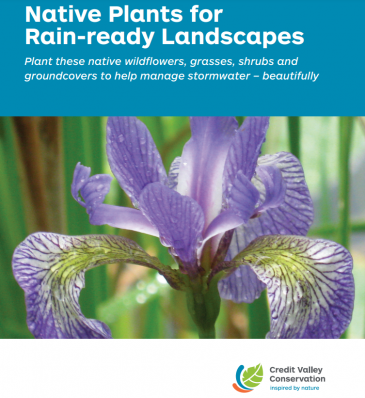
- Rain Gardens - planted shallow depression with rainwater collected from roofs, rain barrel overflows/rainwater harvesting devices and allows water to drain into the surrounding ground within 24 hrs. Generally landscaped with a variety of suitable native plants, that can also benefit pollinator species.
- Infiltration Trenches and Soakaways - Gravel filled pit in this case to collect and transport water from a downspout or rainwater harvesting practice to fit lot-level properties and generally landscaped with river stone, native plants and other decorative rocks or sod. Allows water to drain into the surrounding ground within 24 hrs.
- Bioretention and Bioswales - long trench with gently sloping sides that collects rainwater from impermeable surfaces generally parking lots, boulevards, right-of-ways, etc.) and drains water within 24 hrs. Generally tall grasses and long grasses are planted in the middle and along the bottom part of the swale to aid in reducing the velocity of water entering the practice and to help filter out pollutants.
- Stormwater Tree Trenches - linear tree planting structures that feature supported impermeable or permeable pavements that promote healthy tree growth while also helping to manage runoff. They are often located behind the curb within the road right-of-way and consist of subsurface trenches filled with modular structures and growing medium, or structurally engineered soil medium, supporting overlying sidewalk pavement. Retains and filters out pollutants and salt from urban sites and then allows water to drain into the local municipal storm swear system after a major storm event to help reduce peak flow of water entering into the system and reduces the likelihood of an overwhelmed storm sewer or local surcharge.[9]
How to Choose the Right Plants[edit]
To help you select appropriate plants for your site, we've developed tables to indicate the suitability for use in LID features (see page links under Plant Selection).
- For resilient and robust planting, native species which can tolerate periods of drought and periodic inundation are recommended.
- Woody and evergreen plants should not be planted in any portions of the LID facility to be used for snow storage during winter months.
- Trees and shrubs should be offset from inlets and overflow outlet locations, and lowest-elevation portions of the LID facility, where sediment, trash and natural debris will accumulate, to ensure access for completing routine inspection and maintenance tasks is not hindered.
- Trees should not be planted directly over underdrain perforated pipes and may be better located at the perimeter of LID facilities instead.
- While it is not always necessary to use an exclusively native planting palette, invasive non-native plants (i.e., invasive exotics) should not be planted in LID practices.
Plant Selection[edit]
Note: These pages contain a lot of images and content and will likely take a little longer to load than usual.
Planting Zones[edit]
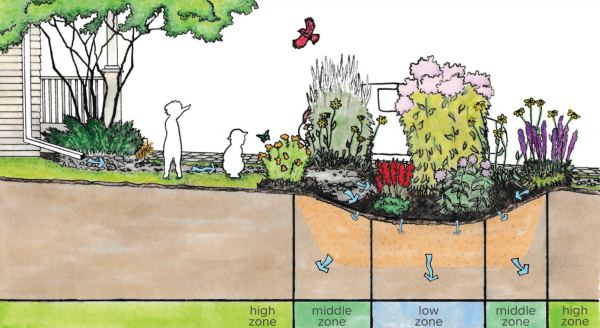
There are three primary zones in a 'rain-ready' LID feature/landscape. These can be seen below:
- Low Zone: Lowest area of the feature, along the bottom of the planted area and is the area that gets fully inundated with water during rain events or heavy runoff leveles enter. Plants that should be chosen here prefer moist soils and should be rated a "3" when referencing our STEP tables above.
- Middle Zone: Middle zone of feature, which can still possess higher soil moisture levels, but that doesn't persist as long as the levels seen in the Low Zone. Plants that should be selected for this area prefer alternating wet and drier periods and should be rated a "2" when referencing our STEP tables above.
- High Zone: High area of the feature in question and as a result its soil moisture levels are very low and it is the driest section of the planted area. Plants selected should have good drought tolerance and should be rated a "1" when referencing our STEP tables above.
Plant Characteristics[edit]
Soil moisture[edit]
Plant species are adapted to specific levels of moisture to achieve establishment and sustained growth. Soil moisture has been characterized by three categories: dry (1), moist (2) and wet (3). Some plants can tolerate a wide range of moisture regimes, whereas others perform optimally in a more narrow range of soil moisture conditions. Species ranked with a dash between two numbers can tolerate a range of conditions.
Shade tolerance[edit]
Plant species react differently to varying levels of sunlight and shade. Plant adaptations to these parameters are referred to in terms of degree of exposure. Most of the LID practices will be installed in newly developed areas, thereby providing exposure to full sun, meaning at least 6 full hours of direct sunlight for plantings. As trees develop over several years, or if an LID practice is installed in an area where there are existing trees or buildings providing partial shade, plants adapted to 3 to 6 hours of sunlight exposure should be used. Plants tolerant of full shade require less than 3 hours of direct sunlight each day. However, some shade-adapted species come into leaf early in the growing season in order to take advantage of full sunlight before tree leaves emerge and create shade.
Our tables indicate whether the species in question is tolerant of shade at all. For more information, consult the sources listed below.
Drought tolerance[edit]
These categories represent broad generalizations regarding drought tolerance.
Salt tolerance[edit]
The low, medium and high categories indicate the tolerance of plant species to salt exposure and/or uptake. Plant species with low salt tolerance should not be used in any LID practice receiving runoff from salted roads and parking lots. Species with medium salt tolerance can be utilized in LID practices that will be receiving road runoff but should not be in the line of salt spray or be receiving the bulk of the runoff. Species with high salt tolerance should be planted in LID practices that receive road or parking lot runoff that routinely contains road salt. Few plants are truly halophytic or “salt-loving”. In most cases, elevated salt levels are temporary and precipitation quickly dilutes and removes salt from the soil profile. The plant lists above under the Plant Selection section includes recommended species for LID practices likely to receive road or parking lot runoff.
The are at least four halophytic grass species native to Ontario. These plants are adapted to growing in saline conditions. Prairie cord grass (Sporobolus michauxianus) and side-oats grama (Bouteloua curtipendula) are excretor halophytes meaning that they take up salt from the soil then disperse it via wind to the environment. Switch grass (Panicum virgatum) and sand dropseed (Sporobolus cryptandrus) are accumulator halophytes meaning that they take up salt from the soil then store it in their aboveground tissues. For more information on these halophyte species, please see the plant selection section under select tall grasses.
Compaction and pollution tolerance[edit]
Development nearly always causes compaction of on-site soil, and bioretention facilities in road-right-of-ways should be pollution tolerant.
STEP stars[edit]
These are species which have demonstrated good performance in projects designed, installed and monitored by the Sustainable Technologies Evaluation Program.
| Plant characteristic | Potential benefit to LID performance |
|---|---|
| Plant mass | Higher biomass consumes more nutrients (decreases nutrient discharge from bioretention) and increases transpiration rate. |
| Growth rate | Higher growth rate consumes more nutrients, particularly in combination with root characteristics as below. |
| Root lipid content | Higher root lipid content has been associated with increased plant uptake of organic contaminants such as polyaromatic hydrocarbons (PAHs) |
| Root length | Longer roots are associated with plants consuming more nutrients and preserving hydraulic conductivity of the filter media. |
| Root mass and thickness | Larger overall root mass and many dense fine roots are associated with increased nutrient uptake by plants. Thicker roots help to preserve hydraulic conductivity of the media. |
| High-nutrient tolerance | Plants adapted to high nutrient environments are likely to uptake nutrients at a higher rate. |
Plant Selection Factors to Consider for LIDs[edit]
Drainage areas[edit]
There are two basic categories:
- Exposure to roadway or parking lot runoff. Runoff is contaminated with deicers and vehicle pollutants. These can take on several forms, including parking lot islands, traffic islands, roundabouts, or cul-de-sacs and are often used as snow storage location
- Select salt tolerant grasses, other herbaceous material and shrubs.
- No exposure to roadway or parking lot runoff. These receive runoff from rooftops or areas that use no deicing salt and have low pollutant exposure, such as courtyard bioretention.
- Practices allow for a greater range of species selection.
Other selection factors:
- Most bioretention cells, rain gardens, stormwater planters, etc., will be situated to receive full sun exposure.
- Facilities with a deeper media bed (1 m or greater) provide the opportunity for a wider range of plant species, including trees.
- The inclusion of vegetation with a variety of moisture tolerances ensures that the bioretention cell will adapt to a variety of weather conditions.
- Proper spacing must be provided for above-ground and below-ground utilities, and adjacent infrastructure.
Selection of plant species suited to tolerate the varied conditions common to green infrastructure is essential for the success of a planting plan. A plant’s ability to tolerate flood conditions is further correlated to its age, adaptation to the site, and condition. A well-established plant has greater reserves to withstand flood events. While it is recommended to leave the LID practice offline until plants become established (one to several years), in most instances this may not feasible. Measures incorporated into the LID practice such as erosion and sediment controls and pre-treatment cells can moderate flows enhancing survival potential. In all cases, soil surfaces must be stabilized prior to allowing flow to enter the LID facility.
Selecting plant material that will be appropriate for a particular site should take into consideration the local context or setting. Some species, especially rare or potentially aggressive species, are not always conducive to the type of site or objective of the project, especially in areas near or next to natural communities. For example, a green roof that is isolated from all natural areas may be ideal for regionally rare species that are specially adapted to conditions of high exposure and shallow soils. Among the questions that should be asked are:
- Is this LID site located within, adjacent or close to a natural area? Or, is this LID site location isolated (i.e. beyond 120 m of natural feature) from the natural environment?
- What is the composition of the nearby natural area?
Native, Introduced and Rare plants[edit]
The goal of planting design for LID practices is to achieve a sustainable vegetation community that is tailored to the ecological qualities of the site and the aesthetic considerations of the landowner. Plant selection for LID practices is predicated on the principle of ‘right plant for the right place'. Many LID practices are carried out within a highly urbanized context that poses unnatural stresses on plant growth and survival. This guide provides general recommendations to direct species selection. Landscape professionals should use this information to generate specific Plant Selection lists that are tailored to the conditions prevalent on site while addressing surrounding urban and natural land uses.
Native and introduced species[edit]
Native plants have co-evolved with the local ecosystems and natural processes. They are genetically better adapted to local climate, soils, insects and diseases of the area, and may require less maintenance to ensure health and survival. Working with native plants helps protect local native biodiversity, allows the LID feature to function ecologically while creating a more diverse, naturally-beautiful, landscape. Where conditions for growing native plants are inhospitable, diversifying the planting palate with introduced species may have a more successful result. In addition to native species, many introduced plants are grown in nurseries and garden centers and are readily available to landowners.
Some introduced species escape from gardens and other managed landscapes and begin to reproduce in the wild. Invasive plants are typically non-native plants that out-compete native species. These species lack natural predators, grow aggressively and reproduce rapidly and can be problematic in the natural environment. Invasive species have not been included on the recommended plant list for LID practices and should not be planted in any situation.
Recommendations:
- In all applications of LID, designing with native plant species is the preferred and strongly recommended option.
- In areas containing, adjacent to, or within a linkage to an existing natural heritage feature, native plants should be used exclusively. In areas regulated by a conservation authority, native plants will be required for approval.
- In settings that have restricted or harsh conditions for plant growth (e.g. limited root volume, unusual patterns of drought and/or inundation, exposure to salt, sun, wind, shade and pollutants) introduced species can be used to substitute/augment native species selection. Introduced species shall be chosen to be functionally and aesthetically appropriate for the location.
- Introduced invasive species should not be planted as these can compromise the function of an LID practice, the ecology of nearby natural areas and can lead to higher maintenance costs. Non-native invasive species have not been included in the LID plant list.
- Except unless otherwise noted, the use of cultivars of native plants should be avoided.
- When sourcing native plant material, especially from commercial nurseries and garden centres, always refer to the scientific (botanical) name for the desired plants. Confusion over cultivated varieties of plants can be avoided by asking questions of the staff to ensure that only the correct native varieties are sourced. Species that are often mislabeled and other common concerns are noted elsewhere on this page.
Rare Species[edit]
Some of the native plants in the LID plant list are ‘rare’ and/or ‘uncommon’ within the Province of Ontario. STEP does not support the incorporation of rare native species in planting plans and designs unless locally sourced material can be obtained and there is little to no threat of escape into naturally occurring populations. Genes from plants adapted to other areas can inadvertently introduce harmful traits that weaken the ability of the native population to thrive. Rare species are not always appropriate for LID practices depending on the project objectives or the characteristics of the site, especially in situations where rare species may be planted near natural communities. In these situations, the opportunity for genetic contamination of native populations is higher and the planting of rare species is unadvised.
- Some native species are rare because they require specific habitat conditions in order to grow which may not exist or be able to be restored easily. The benefits to landscaping with native, common plant material is that plantings may be better adapted to a wider range of conditions, and may tolerate more disturbance. A higher success rate and lower maintenance requirement may be achieved.
The method and collection of native plants is an important consideration when sourcing rare plant material. Ecologically responsible methods of seed collection and propagation ensure that wild populations are not over harvested and that they have the ability to keep adapting over time. Seeds should not be collected or existing plants relocated from the wild for use in LID practices. When sourcing material from growers and nurseries, the plant material origin should be confirmed as well as its method of collection and propagation.
Recommendation: In areas containing, adjacent to, or within a linkage to an existing natural heritage feature, common native plants should be used exclusively. In areas regulated by a watershed authority rare species are not suitable for planting unless the local source/provenance is documented and approved. Rare species should only be used sparingly when there are no suitable common species available and reasons for selection should be provided. Where rare species are included in a design, it should be ensured that the plants are procured from locally adapted seed sources. Biologists, botanists and ecologists can help guide the sourcing and selection of plant material. Furthermore, nurseries that specialize in native plants and associated rare species should be contacted to source material.
Natural Processes[edit]
A plant community is not a static entity; rather it is always growing and changing in response to natural processes and disturbance events. When utilizing a plant community as an analogue for design, it is essential to understand the role of agents that affect the composition of the plant community over time. Designers and managers may need to mimic or compensate for the natural processes in a management plan. Consideration should be given for the impact of natural processes and disturbances to the long term vision of the proposed LID landscape design. Natural ecosystems develop and are maintained through natural changes such as the onset of shading, and disturbance events such as:
- Seasonal storm events / flooding outside the design norms
- Prolonged drought
- Microclimate change and progression - sun / shade / moisture
- Plant competition, successional growth, invasive behaviour
- Weeds entering from other sources
- Herbivory
- Pests and diseases
- Changes in soil chemistry / nutrients
- Development of soil structure
- Maturation and decline of plants
External resources[edit]
| Organization | Coverage | Types of Material | Website |
|---|---|---|---|
| Credit Valley Conservation | Ontario | Native Grasses, Ferns, Shrubs, Small Trees | https://cvc.ca/document/plant-list-native-plants-for-rain-ready-landscapes/?access=8fb53274fcf90837941a9cc25086f47a |
| City of Toronto | Southern Ontario - Specifically Richmond Hill (or any Municipality located in Zone 5B) | Native and non-native Grasses, Ferns, Shrubs, Trees, Herbaceous, Graminoids, and Vines | https://www.toronto.ca/wp-content/uploads/2017/11/9844-2017_V-1.0_CoT-Green-Streets_Vegetation-Selection-Tool.xlsx |
| Watersheds Canada | Canada / Ontario | Native Grasses, Ferns, Shrubs, Trees, Vines | https://watersheds.ca/plant-database/ |
| Columbia University, University of Maryland, Smithsonian Institute* | North eastern USA and Canada | Native and non-native trees and shrubs | http://leafsnap.com/species/ |
| Louisiana State University | USA | Grasses, Ferns, Herbaceous, Shrubs, Trees, Vines, Ornamental | http://onlineplantguide.com/Index.aspx |
| United States Department of Agriculture | USA | Grasses, Ferns, Herbaceous, Shrubs, Trees, Vines, Ornamental | https://plants.usda.gov/java/ |
*Leafsnap is an on-line field guide, available as a free mobile app that uses visual recognition software to help identify tree species from photos of their leaves, flowers and fruits. [14]
See Also[edit]
- Planting design
- Bioretention
- Bioswales
- Enhanced grass swales
- Green roofs
- Rain gardens
- Stormwater planters
- Stormwater tree trenches
- Swales
- Vegetated filter strips
- Wetlands
References[edit]
- See also Planting design
Gallery[edit]
Streetside swale in Seattle
This feature is a bioswale in that the underlying soil has been replaced with engineered filter media. The turf finish simplifies landscape maintenance. Brampton, ON
A bioswale located on Country Court Blvd., located in Brampton, ON> Read more about the performance of this feature and associated rpoject, by reading the following Grey to Green Conference Presentation, 2018. Dean Young - STEP, 2018
Bioswale located in Downsview Park, Toronto ON. with Check dams.
Grassed bioswale with Vegetated filter strips
Stone-lined bioswale with rock check dams located to helps slow the flow of water as it enter the system from the nearby roads. [[ STEP, 2017
Performance[edit]
While few field studies of the pollutant removal capacity of bioswales are available from cold climate regions like Ontario, it can be assumed that they would perform similar to bioretention cells. Bioretention provides effective removal for many pollutants as a result of sedimentation, filtering, plant uptake, soil adsorption, and microbial processes. It is important to note that there is a relationship between the water balance and water quality functions. If a bioswale infiltrates and evaporates 100% of the flow from a site, then there is essentially no pollution leaving the site in surface runoff. Furthermore, treatment of infiltrated runoff will continue to occur as it moves through the native soils.
| LID Practice | Location | Runoff Reduction* | Reference |
|---|---|---|---|
| Bioswale without underdrain | Washington | 98% | Horner et al. (2003)[15] |
| Scotland | 94% | Jefferies (2005)[16] | |
| Bioswale with Underdrain | Maryland | 46 to 54% | Stagge (2006)[17] |
| Bioretention without underdrain | China | 85 to 100%* | Gao, et al. (2018)[18] |
| Connecticut | 99% | Dietz and Clausen (2005) [19] | |
| Pennsylvania | 80% | Ermilio (2005)[20] | |
| Pennsylvania | 70% | Emerson and Traver (2004)[21] | |
| Bioretention with underdrain | |||
| Ontario | 64% | CVC (2020)[22] | |
| Maryland and North Carolina | 20 to 50% | Li et al. (2009) [23] | |
| North Carolina | 40 to 60% | Smith and Hunt (2007)[24] | |
| North Carolina | 33 to 50% | Hunt and Lord (2006) [25] | |
| Runoff Reduction Estimate* | 85% without underdrain;
45% with underdrain | ||
- ↑ Mullen, T.J. Prioritizing trash capture and clean oceans: Stormwater hoods and traps lead the way in effectiveness. The Municipal magazine. June 1, 2022. Accessed: https://www.themunicipal.com/2022/06/prioritizing-trash-capture-and-clean-oceans-stormwater-hoods-and-traps-lead-the-way-in-effectiveness/
- ↑ Erickson, A.J. and Hernick, M.A., 2019. Capture of Gross Solids and Sediment by Pretreatment Practices for Bioretention. Accessed: https://conservancy.umn.edu/handle/11299/201607
- ↑ Halvorson, Tighe & Bond Studio. n.d. Halvorson, Tighe & Bond Studio. Retrieved from: https://www.halvorsondesign.com/willard-street-drainage
- ↑ Philadelphia Water Department. n.d. Chapter 4 Stormwater Management Practice Guidance 4.1 Bioinfiltration/Bioretention. Retrieved from: https://water.phila.gov/development/stormwater-plan-review/manual/chapter-4/4-1-bioinfiltration-bioretention/
- ↑ National Association of City Transportation Officials (NACTO). 2017. Urban Street Stormwater Guide - Inlet Design. Retrieved from: https://nacto.org/publication/urban-street-stormwater-guide/stormwater-elements/bioretention-design-considerations/inlet-design/
- ↑ Philadelphia Water Department. 2020. Stormwater Management Guidance Manual: Version 3.2. Accessed from: https://www.pwdplanreview.org/upload/manual_pdfs/PWD-SMGM-v3.2-20201001.pdf
- ↑ Hunt, W. F., Lord, B., Loh, B., & Sia, A. (2015). Plant Selection for Bioretention Systems and Stormwater Treatment Practices. Singapore: Springer Singapore. https://doi.org/10.1007/978-981-287-245-6
- ↑ CVC. 2022. Native Plants for Rain-ready Landscapes. Plant these native wildflowers, grasses, shrubs and groundcovers to help manage stormwater – beautifully. cvc.ca/GreenYourProperty. https://cvc.ca/document/plant-list-native-plants-for-rain-ready-landscapes/?access=0fa290a78fd5934ad7848f934da7322da
- ↑ CVC. 2022. Native Plants for Rain-ready Landscapes. Plant these native wildflowers, grasses, shrubs and groundcovers to help manage stormwater – beautifully. cvc.ca/GreenYourProperty.https://cvc.ca/document/plant-list-native-plants-for-rain-ready-landscapes/?access=8fb53274fcf90837941a9cc25086f47a.
- ↑ CVC. 2022. Native Plants for Rain-ready Landscapes> plant these native wildflowers, grasses, shrubs and groundcovers to help manage stormwater - beautifully. cvc.ca/GreenYourProperty. https://cvc.ca/wp-content/uploads/2022/03/com_lo_rain-ready-guide_20220328-FINAL3.pdf
- ↑ Muerdter, C.P., C.K. Wong, and G.H. LeFevre. 2018. Emerging investigator series: the role of vegetation in bioretention for stormwater treatment in the built environment: pollutant removal, hydrologic function, and ancillary benefits. Environ. Sci. Water Res. Technol. 4(5): 592–612. doi: 10.1039/C7EW00511C.
- ↑ Montréal Space for Life. n.d. The Green Pages. Native, exotic, naturalized or invasive. Accessed: April 12, 2022. https://espacepourlavie.ca/en/native-exotic-naturalized-or-invasive
- ↑ Webb. J. 2021. Are Shasta daisies native to Ontario? cubetoronto.com. Accessed: April 12, 2022 https://cubetoronto.com/ontario/are-shasta-daisies-native-to-ontario/
- ↑ Columbia University, University of Maryland, Smithsonian Institute. 2018. Leafsnap. http://leafsnap.com/species/
- ↑ Horner RR, Lim H, Burges SJ. HYDROLOGIC MONITORING OF THE SEATTLE ULTRA-URBAN STORMWATER MANAGEMENT PROJECTS: SUMMARY OF THE 2000-2003 WATER YEARS. Seattle; 2004. http://citeseerx.ist.psu.edu/viewdoc/download?doi=10.1.1.365.8665&rep=rep1&type=pdf. Accessed August 11, 2017.
- ↑ Jefferies, C. 2004. Sustainable drainage systems in Scotland: the monitoring programme. Scottish Universities SUDS Monitoring Project. Dundee, Scotland. https://www.climatescan.nl/uploads/projects/8126/files/1277/SNIFFERSR_02_51MainReport.pdf
- ↑ Stagge, J. 2006. Field evaluation of hydrologic and water quality benefits of grass swales for managing highway runoff. Master of Science Thesis, Department of Civil and Environmental Engineering, University of Maryland. https://drum.lib.umd.edu/items/42be6ce6-e4ef-4162-a991-c273607d422d
- ↑ Gao, J., Pan, J., Hu, N. and Xie, C., 2018. Hydrologic performance of bioretention in an expressway service area. Water Science and Technology, 77(7), pp.1829-1837.
- ↑ Dietz, M.E. and J.C. Clausen. 2005. A field evaluation of rain garden flow and pollutant treatment. Water Air and Soil Pollution. Vol. 167. No. 2. pp. 201-208. http://citeseerx.ist.psu.edu/viewdoc/download?doi=10.1.1.365.9417&rep=rep1&type=pdf
- ↑ Ermilio, J.F., 2005. Characterization study of a bio-infiltration stormwater BMP (Doctoral dissertation, Villanova University). https://www1.villanova.edu/content/dam/villanova/engineering/vcase/vusp/Ermilio-Thesis06.pdf
- ↑ Emerson, C., Traver, R. 2004. The Villanova Bio-infiltration Traffic Island: Project Overview. Proceedings of 2004 World Water and Environmental Resources Congress (EWRI/ASCE). Salt Lake City, Utah, June 22 – July 1, 2004. https://ascelibrary.org/doi/book/10.1061/9780784407370
- ↑ Credit Valley Conservation. 2020. IMAX Low Impact Development Feature Performance Assessment. https://sustainabletechnologies.ca/app/uploads/2022/03/rpt_IMAXreport_f_20220222.pdf
- ↑ Li, H., Sharkey, L.J., Hunt, W.F., and Davis, A.P. 2009. Mitigation of Impervious Surface Hydrology Using Bioretention in North Carolina and Maryland. Journal of Hydrologic Engineering. Vol. 14. No. 4. pp. 407-415.
- ↑ Smith, R and W. Hunt. 2007. Pollutant removals in bioretention cells with grass cover. Proceedings 2nd National Low Impact Development Conference. Wilmington, NC. March 13-15, 2007.
- ↑ Hunt, W.F. and Lord, W.G. 2006. Bioretention Performance, Design, Construction, and Maintenance. North Carolina Cooperative Extension Service Bulletin. Urban Waterways Series. AG-588-5. North Carolina State University. Raleigh, NC.
